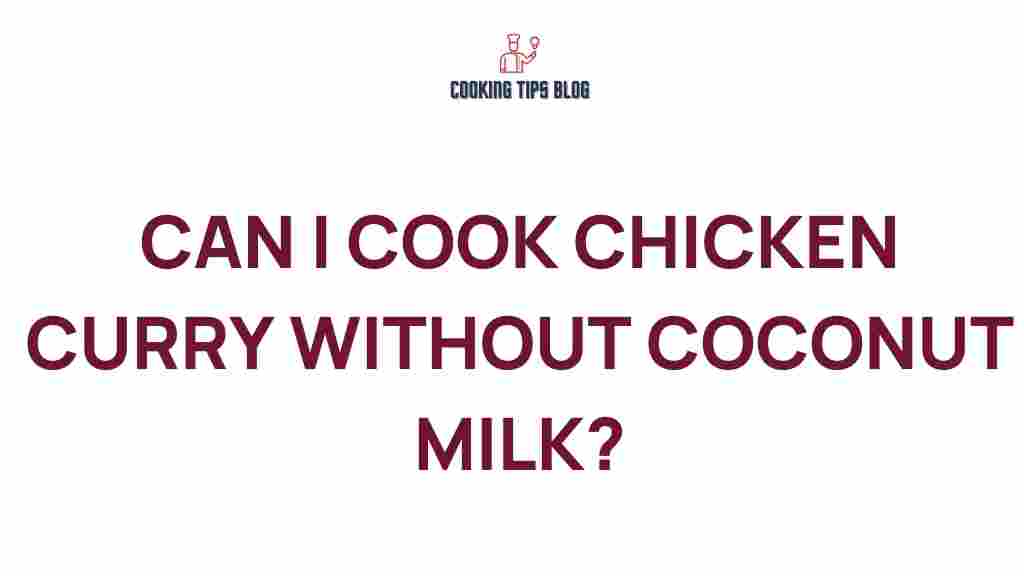Can You Cook Chicken Curry Without Coconut Milk?
Chicken curry is a beloved dish around the world, known for its rich flavors and comforting warmth. Traditionally, many recipes call for coconut milk to add creaminess and sweetness. However, not everyone has coconut milk readily available, or some may prefer alternatives due to dietary restrictions or taste preferences. If you find yourself in this situation, don’t worry! This article will explore several alternatives to coconut milk that you can use to create a delicious chicken curry.
Understanding Chicken Curry
Chicken curry is more than just a single recipe; it’s a term that encompasses a wide variety of dishes across different cultures. Each recipe has its unique blend of spices, cooking techniques, and ingredients. While coconut milk is often a key component, there are several ways to achieve that creamy texture and rich flavor without it.
Why Substitute Coconut Milk?
There are several reasons you might want to cook chicken curry without coconut milk:
- Dietary Restrictions: Some individuals are allergic to coconut or follow diets that eliminate certain ingredients.
- Availability: Coconut milk may not be available in your pantry or local grocery store.
- Flavor Preferences: Some people may prefer different flavors or textures in their chicken curry.
Alternatives to Coconut Milk in Chicken Curry
Below are some fantastic alternatives to coconut milk that you can use in your chicken curry, allowing you to maintain that delicious flavor and texture.
1. Yogurt
Using yogurt can add a tangy flavor and creamy texture to your chicken curry. Here’s how to use it:
- Choose plain, unsweetened yogurt for the best results.
- Mix the yogurt with a bit of water to achieve a consistency similar to coconut milk.
- Stir in the yogurt towards the end of cooking to prevent curdling.
2. Cream or Half-and-Half
If you’re looking for a rich and creamy alternative, heavy cream or half-and-half can work well. Here’s how to incorporate it:
- Add cream after sautéing your spices and vegetables.
- Simmer the curry gently to allow the flavors to meld.
3. Almond Milk
Almond milk is a lighter alternative that adds a subtle nutty flavor. Follow these steps:
- Use unsweetened almond milk to avoid altering the dish’s flavor.
- Combine almond milk with a thickener like cornstarch or flour to achieve a creamier texture.
4. Cashew Cream
For a nutty and rich flavor, cashew cream is an excellent choice. To make cashew cream:
- Soak raw cashews in water for several hours.
- Blend soaked cashews with water until smooth and creamy.
- Stir the cashew cream into your curry for a delightful texture.
5. Unsweetened Soy Milk
Another alternative is unsweetened soy milk, which provides a good texture without overpowering the dish. Consider these tips:
- Use soy milk as a direct substitute for coconut milk in your recipe.
- Consider adding a tablespoon of peanut butter for an extra depth of flavor.
6. Vegetable or Chicken Broth
If you’re looking for a lighter option, broth can be a great base for chicken curry. Here’s how to use it:
- Replace coconut milk with an equal amount of broth.
- Add additional seasonings or spices to enhance the flavor.
7. Tomato Sauce or Puree
For a different flavor profile, tomato sauce or puree can be an interesting choice. Here’s how:
- Substitute coconut milk with tomato sauce in equal parts.
- Consider adding cream or yogurt afterward to balance the acidity of the tomatoes.
Step-by-Step Process to Cook Chicken Curry Without Coconut Milk
Now that you know the alternatives, let’s dive into a simple chicken curry recipe using yogurt as a substitute for coconut milk. This recipe is easy to follow and packed with flavor!
Ingredients
- 500g chicken (cut into pieces)
- 1 cup plain yogurt
- 2 onions (finely chopped)
- 3 cloves garlic (minced)
- 1 tablespoon ginger (grated)
- 2 tomatoes (pureed)
- 2 tablespoons curry powder
- 1 teaspoon cumin
- 1 teaspoon turmeric
- Salt and pepper to taste
- 2 tablespoons cooking oil
- Fresh cilantro for garnish
Instructions
- Prepare the Marinade: In a bowl, mix the yogurt, curry powder, cumin, turmeric, garlic, and ginger. Add the chicken pieces and marinate for at least 30 minutes.
- Sauté Onions: In a large pot, heat the oil over medium heat. Add the chopped onions and sauté until they are golden brown.
- Add Chicken: Stir in the marinated chicken and cook until it’s browned, about 5-7 minutes.
- Incorporate Tomatoes: Add the pureed tomatoes to the pot and let it simmer for 10 minutes.
- Simmer: Reduce the heat and cover the pot. Let the chicken cook through, about 15-20 minutes. Stir occasionally.
- Season: Taste and adjust the seasoning with salt and pepper.
- Serve: Garnish with fresh cilantro and serve hot with rice or naan.
Troubleshooting Tips
When making chicken curry without coconut milk, you may run into a few challenges. Here are some troubleshooting tips:
- Too Thin: If your curry is too watery, thicken it with a slurry of cornstarch or add a little more yogurt or cream.
- Too Thick: Add a splash of broth or water to thin it out to your desired consistency.
- Flavor Issues: If the flavors are lacking, consider adding more spices, herbs, or a squeeze of lemon juice for brightness.
Conclusion
Cooking chicken curry without coconut milk is not only possible but can also lead to delicious results. With a variety of alternatives available, you can customize your dish to suit your tastes and dietary needs. Whether you choose yogurt, almond milk, or even cashew cream, you can create a rich and flavorful chicken curry that satisfies. For more recipes and tips on cooking chicken curry, be sure to check out this comprehensive guide! Happy cooking!
This article is in the category Recipes and created by Cookingtipsblog Team
